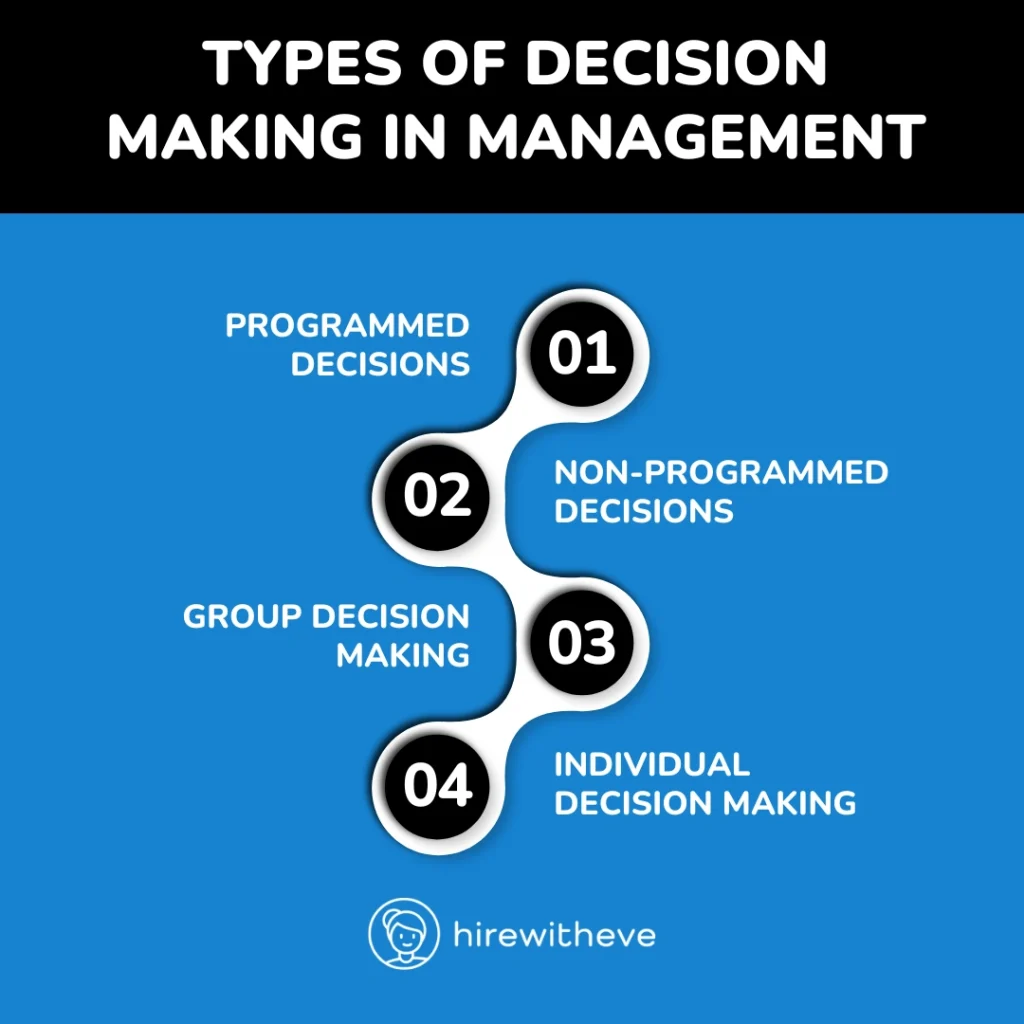Decision Making in Management: A Comprehensive Guide

Effective decision making in management is crucial for organizations aiming to succeed in today’s fast-paced business environment. For talent acquisition specialists and HR managers, decision making goes beyond just selecting the right candidates; it involves strategic thinking, balancing resources, and aligning hiring practices with long-term organizational goals.
In this blog, we will explore the critical elements of decision making in management, identify strategies that support good decision-making, and discuss how modern tools, like HirewithEve.ai, can enhance this process.
Understanding Decision Making in Management
At its core, decision making in management involves choosing the best course of action from a set of alternatives to achieve specific business objectives. HR managers and talent acquisition specialists must make decisions on various levels, from tactical (such as choosing between two qualified candidates) to strategic (like restructuring an entire hiring process).
The nature of decision making in management requires considering multiple factors, including organizational goals, team dynamics, external market conditions, and the availability of resources. It also requires HR professionals to be both analytical and empathetic, understanding the impact of their choices on the workforce.
Key Types of Decision Making in Management
In the context of HR and talent acquisition, there are several forms of decision making in management:

Programmed Decisions: These are routine decisions that HR professionals make regularly, such as setting hiring timelines or selecting recruitment channels. Programmed decisions follow established protocols and require little customization.
Non-Programmed Decisions: These involve unique or unstructured challenges, such as determining how to handle a sudden vacancy in a senior position. Non-programmed decisions often require creative thinking and situational analysis.
Group Decision Making: Often, key HR decisions require input from various stakeholders, including department heads, hiring managers, and C-suite executives. Collaborative decision making in management can enhance the quality of decisions but also introduce complexity as more opinions are involved.
Individual Decision Making: Many day-to-day decisions in HR fall to individuals. For example, a talent acquisition specialist may decide on the most appropriate interview format. The ability to make these individual decisions effectively is a key skill for HR professionals.
Factors Influencing Decision Making in Management
A variety of internal and external factors can impact decision making in management:
Data and Analytics: In the age of data-driven business, access to accurate data is critical for making informed decisions. HR managers rely on performance metrics, turnover rates, and applicant tracking systems to guide their hiring strategies.
Company Culture: Organizational culture plays a significant role in decision making in management. HR professionals must ensure that their decisions align with the company’s values, mission, and long-term vision. For instance, promoting diversity and inclusion through hiring practices may influence the way decisions are made.
Risk Management: Every decision carries a degree of risk. HR managers need to assess both the short-term and long-term consequences of their decisions, balancing risk with potential rewards.
Technology: Advanced technologies like AI and machine learning have revolutionized decision making in management. Talent acquisition platforms and recruitment software tools provide valuable insights into candidate performance and potential, enabling HR managers to make faster, more informed decisions.
Leadership Influence: Leadership styles and development significantly impact decision making in management. Leaders who foster open communication and trust tend to encourage more dynamic and innovative decision-making processes within their teams.
Decision Making in Management: Strategies for Success
Improving decision making in management within HR requires a combination of strategic approaches and practical tools. Some effective strategies include:
Data-Driven Decision Making: Relying on analytics and predictive tools can help HR managers make more objective and effective decisions. Whether selecting candidates or assessing employee performance, data should be at the heart of the process.
Inclusive Decision Making: Involving multiple perspectives in decision making leads to better outcomes. HR managers should engage with diverse teams to gather different viewpoints and insights, particularly when making decisions about hiring or employee development.
Scenario Planning: HR professionals should anticipate various outcomes by practicing scenario planning. This approach helps to prepare for different contingencies, making decision making in management more agile and responsive.
Continuous Learning: Just as candidates upskill to remain competitive, HR managers and talent acquisition specialists should continuously refine their decision-making skills. Staying updated on trends in recruitment, technology, and leadership development is crucial to maintaining a forward-thinking approach to management.
A 2023 study by the Society for Human Resource Management (SHRM) revealed that HR leaders who prioritize data-driven and inclusive decision-making saw a 20% increase in employee retention and a 15% improvement in overall company performance.
These results underscore the importance of evolving decision making in management practices to meet the challenges of modern talent acquisition.
Conclusion
While effective decision making in management is driven by a variety of factors such as data, technology, and leadership influence, having the right tools is essential. This is where HirewithEve.ai comes into play.
HirewithEve.ai provides HR managers and talent acquisition specialists with powerful tools to streamline their decision-making processes. With its advanced skills-based hiring features, HirewithEve.ai allows for more data-driven decisions, reducing the bias and guesswork in candidate selection. The platform’s ability to assess remote talent from anywhere in the world also supports more flexible and inclusive decision making in management.
Additionally, HirewithEve.ai integrates with existing ATS platforms, ensuring that all candidate data is easily accessible and actionable during the hiring process. Whether HR managers are making programmed or non-programmed decisions, HirewithEve.ai’s analytics and insights ensure that every decision is backed by relevant data and strategic foresight.
Ultimately, using HirewithEve.ai enhances decision making in management by providing HR professionals with the right tools to make faster, more informed, and more inclusive decisions, thereby driving success in recruitment and talent management.
